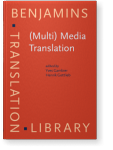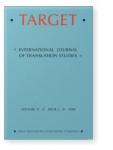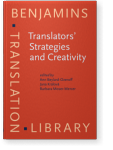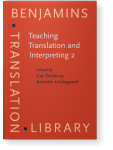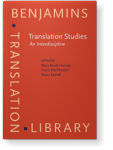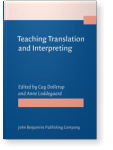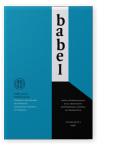Bistra Alexieva
List of John Benjamins publications for which Bistra Alexieva plays a role.
2001 Interpreter-Mediated TV Live Interviews (Multi) Media Translation: Concepts, practices, and research, Gambier, Yves and Henrik Gottlieb (eds.), pp. 113–124 | Article
1999 Interpreter Mediated TV Events Target 11:2, pp. 329–356 | Article
The major claims made here pertain to: (1) The dominant role of the Participants paremeter, where distinction is made between the "on-screen" and the "off-screen" casts, with the Interpreter acting as Mediator in two communicative channels; (2) The specificity of the TV product as a Polysemiotic… read more
1998 Consecutive interpreting as a decision process Translators' Strategies and Creativity: Selected Papers from the 9th International Conference on Translation and Interpreting, Prague, September 1995, Beylard-Ozeroff, Ann, Jana Králová and Barbara Moser-Mercer (eds.), pp. 181–188 | Article
1994 On teaching note-taking in consecutive interpreting Teaching Translation and Interpreting 2: Insights, aims and visions. Papers from the Second Language International Conference Elsinore, 1993, Dollerup, Cay and Annette Lindegaard (eds.), pp. 199–206 | Article
1994 Types of texts and intertextuality in simultaneous interpreting Translation Studies: An Interdiscipline: Selected papers from the Translation Studies Congress, Vienna, 1992, Snell-Hornby, Mary, Franz Pöchhacker and Klaus Kaindl (eds.), pp. 179–188 | Article
1992 The optimum text in simultaneous interpreting: a cognitive approach to interpreter training Teaching Translation and Interpreting: Training Talent and Experience. Papers from the First Language International Conference, Elsinore, Denmark, 1991, Dollerup, Cay and Anne Loddegaard (eds.), pp. 221–230 | Chapter
1990 Creativity in simultaneous interpretation Babel 36:1, pp. 1–6 | Article
Le caractère créatif de l'interprétation simultanée (IS) est étudié à la lumière de la définition d'A. Lutzkanov au sujet du processus créatif en tant que processus se basant sur un choix non réglementé. On indique les moments dans les différentes phases de l'IS (par exemple lorsque l'on analyse… read more
